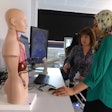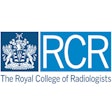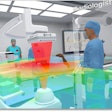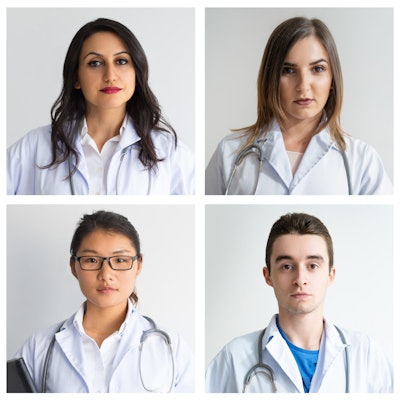
Radiology trainees are having to get used to a whole new way of working that may include redeployment to another unit at short notice, according to a podcast produced by a team of U.K. trainees about how the pandemic is transforming their lives.
The most notable change over the past two months has been the much reduced workload in radiology departments, explained Dr. Jamie Howie and Dr. Uzoma Nnajiuba, who are both ST4 clinical radiologists in North-West England.
"The amount of work is dramatically reduced," Howie said. "There's hardly anything to report at the moment, and often there are only a few CTs and chest x-rays to share around between the senior consultants. It's a very paradoxical situation within radiology right now."
Staff in his department have recently vetted around 2,000 CT requests, and although no appointments have yet been made for them, all those scans are going to need to be done at some point, he added.
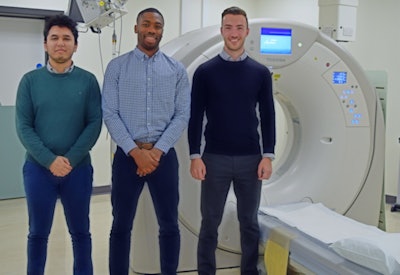 The RadCast team. From the left: Drs. Muhammad Khan, Uzoma Nnajiuba, and Jamie Howie. RadCast is a series of podcasts developed by clinical radiology trainees on a mission to provide a grassroots perspective.
The RadCast team. From the left: Drs. Muhammad Khan, Uzoma Nnajiuba, and Jamie Howie. RadCast is a series of podcasts developed by clinical radiology trainees on a mission to provide a grassroots perspective."There's a lot of COVID collateral damage," Nnajiuba said. "Eventually all the outpatient work will need to be done, and there's definitely a backlog building up. Everyone's tried to mitigate the effects on other vital services, but you do worry there's going to be a knock-on effect in other areas like cancer imaging, with delayed scans and delayed presentations for other conditions as well."
Another concern is the late presentation of patients with potentially life-threatening symptoms. Instead of presenting with chest pain for myocardial infarctions, some patients are coming to the hospital a week later with heart failure, Howie noted.
Changes in work practices
Since the new national regime and lockdown were announced by the government in the U.K. on 16 March, the Royal College of Radiologists (RCR) has provided extensive general advice for trainees. Also, they have been provided with comprehensive details of online resources by their training scheme, including how to keep a log of all the Continuing Professional Development (CPD) that they are doing.
In daily clinical routine, even relatively simple tasks have become more complex over recent weeks, and procedures are taking longer than normal due to the extra anticontagion precautions required. Howie gives the example of an inpatient ultrasound scan.
"In the intensive care unit or on one of the COVID-19 wards, it's not that straightforward," he said. "It takes so much longer to don and doff the PPE (personal protective equipment) than actually look for gallstones or hydronephrosis. Then we have to clean down all the equipment. We've been told to allow 90 minutes for a bedside ultrasound scan."
Redeployment roulette
Trainees must be prepared to go to an unfamiliar department at short notice, and this may cause anxiety for some, according to Nnajiuba.
"I'm in this weird state of limbo at the moment where I have been redeployed to a new unit that's been set up to take COVID-19 step-down patients previously hospitalized with the virus, but the unit's not technically open yet," he explained. "There's now a lot of spare bed capacity within some hospitals, so I'm unsure whether I'm actually going to be redeployed to the ward. I've done the full induction for the new unit, but I haven't actually got my hands dirty yet. Who knows if I ever will get to use the e-prescribing skills and the stethoscope?"
In the U.K., trainees undertake three years of core training (ST1-ST3), followed by two years of subspecialty training (ST4-ST5) or three years if doing interventional radiology (ST4-ST6). Exams have been postponed, and trainees expect to hear more in the next month or so about possible rescheduling. However, the formal assessment process, the Annual Review of Competence Progression (ARCP), is still going ahead. The RCR has allowed a new ARCP outcome to allow for any shortcomings due to the pandemic.
"This means that the ARCP Panel will acknowledge that there may be shortcomings in a portfolio due to the pandemic," Howie said. "Trainees won't fail the year as a result of that, but it will make the following year very busy for them because they're going to be expected to catch up on the missed assessments and missed reporting numbers."
Trainees have had to take greater responsibility for their own skill development, but the good news is radiology has a wide range of free online resources, Nnajiuba noted. He's made plenty of use of the RSNA 2019 virtual meeting, watching video presentations and reading e-posters. Also, he's enjoyed the European Society of Radiology's recent webinars.
"I've read a lot of Radiographics articles, which I'm a big fan of, particularly ones on the head and neck," he said, adding that he's concentrated on personal development too. "I've done more nonradiology stuff like trying to keep fit and doing yoga in the mornings. I've taken about five minutes off my 5K time as well, so there's definitely a few silver linings to the big coronavirus cloud."
Howie agrees, noting that the website radiologycorelectures.org has proved invaluable to him, especially the musculoskeletal material.
What does the future hold?
Looking ahead to the post-COVID-19 future, the duo agreed about the difficulty of making any strong predictions.
"It's just a case of establishing this new holding pattern and finding out how we can balance the obvious need to return to some semblance of normality with being able to deal with any subsequent waves of the virus until we get a vaccine," Nnajiuba said.
Howie thinks the trickiest aspect is that the hospitals don't want to be caught on the backfoot, should there be another spike. He described managing the interim period as a fine balance between still doing the outpatient work and more routine examinations, without putting people at risk and without taking people away from services that may be needed very acutely in the months ahead.
You can listen to the full podcast on the RadCast Anchor page or by searching for RadCast on Spotify or Apple Podcasts.










